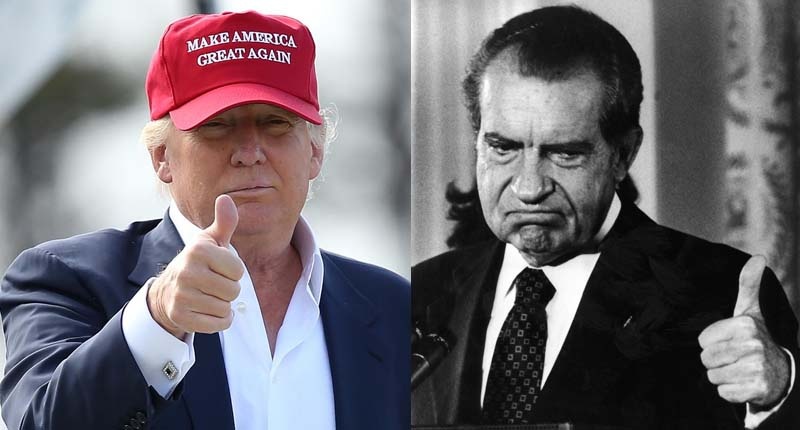
It’s now widely recognized that there is a kind of Cold-Civil War going on now within the US government, between President Donald Trump and the intelligence community, which has become increasingly adversarial.
Washington Post columnist David Ignatius, an establishment writer who has long defended the CIA, provided the early details of national security adviser, Gen. Michael Flynn’s phone call with a Russian ambassador. The leaking of this information was certainly illegal and was acquired using warrantless wiretap methods that itself would have been illegal just a few years ago. While it is unlikely that Flynn committed any illegal acts, his failure to be forthcoming about the discussion ultimately resulted in his resignation. It embarrassed the President and further added to the belief that there is unethical, illegal, or even treasonous behavior going on between Trump and Russia.
Senate Minority Leader Chuck Schumer warned Trump during an MSNBC interview last month:
“Let me tell you: You take on the intelligence community — they have six ways from Sunday at getting back at you.”
This echoes what I’ve been saying for years now; mass surveillance isn’t about terrorism or crime, but about acquiring ammunition for political blackmail. Mass surveillance like the PRISM program hasn’t had a measurable impact on crime or terrorism, but it has allowed the intelligence community to tighten its grip on the country’s politicians.
This kind of conflict between the executive branch and the intelligence community isn’t unprecedented. Some of what is happening is reminiscent of the Nixon era. President Nixon was also at odds with what he called the “the east coast liberals”, which includes not only newspapers and television, but also Wall Street and the intelligence community. Originally from California, Nixon hated them, but recognized and feared their power, and their potential for violence.
Just like Nixon, Trump’s primary enemies are largely hidden from public scrutiny. They are, as Julian Assange recently pointed out, a segment of the intelligence community “who consider themselves to be the ‘permanent government.'”

Nixon’s chief aids often noted that Nixon was obsessed with the “Bay of Pigs thing.” It doesn’t take a genius to figure out that Nixon wasn’t really talking about the failed invasion of Cuba during the Kennedy administration, but rather the President’s assassination a year later, allegedly for botching the operation and embarrassing the CIA.
What Nixon really knew about the assassination, we will never know, but he did know that Kennedy’s assassination was preceded by conflict with the CIA, who have a penchant for murder and coup d’etats against foreign governments who opposed them. Similar to Trump, Nixon had angered many in the government with overtures of peace between Soviet Russia and China without the consent of the military apparatus.
In Nixon’s memoirs, he writes that the break in at the Watergate Hotel made no tactical sense:
“Anyone who knew anything about politics would know that a national committee headquarters was a useless place to go for inside information… The whole thing was so senseless and bungled that it almost looked like some kind of setup.”
Indeed, the burglars who had amateurishly been caught breaking into the Watergate hotel were quickly linked to the Nixon administration, but they also had ties to the CIA and to the Bay of Pigs incident. That the president’s closest advisers might work diligently for him while secretly trying to undermine him is not a foreign concept to clandestine services.
Of the major books on the Watergate scandal written over the last 30 years, at least three of them conclude that Nixon was set up by elements within the CIA. These include Secret Agenda (1984) by Harper’s editor Jim Hougan, Silent Coup (1991) by Len Colondy and Robert Gettlin, and The Strong Man (2008) by Fox News correspondent James Rosen.

Rosen’s book in particular, a biography of John N. Mitchell, took 17 years to write and includes new interviews with those involved in Watergate. The book also discusses newly released recordings of the Nixon administration. Rosen concludes that these new tapes “unmasked Nixon as… aging and confused… lost in a welter of detail,” and generally incapable of discerning his friends from his enemies, ultimately contributing to his inability to successfully defend against criticism.
Nixon’s hubris may have made him vulnerable to the charge that he was an “imperial president,” but it was an organized opposition operating within the government which ultimately dethroned him from power. Similarly, it seems as though the intelligence community within the US is attempting to repeat history by setting up Trump for an embarrassing stay in office.
Unlike Nixon, Trump has never enjoyed a honeymoon with Wall Street and their associated intelligence factions. Inferences that he is tainted by associations with Russia or that Russia hacked the election for his benefit have repeatedly been disproven, but in an image based society, the image is reality, making Trump especially vulnerable to any scandal involving US-Russian relations.

When pressed, most media outlets admit there is little or no evidence for illegal collusion between the Trump and Russia, but numerous scandals have created an impression in many people’s minds that “where there’s enough smoke, there is fire.” Of course, whoever said that has obviously never been in the Boy Scouts. Where the national security apparatus is concerned, more smoke does not indicate fire, rather it indicates the presence of a mass-media PSYOP.
Critics who fantasize about the nation’s spy apparatus undermining Trump’s presidency should know that coups of this kind typically destroy any sense of normalcy the country might have previously enjoyed. Its hard to imagine this turning out well.

If you enjoyed this content, please donate. Even $1 or $5 makes a difference. You can donate via Paypal (see tip jar to the right) or with

